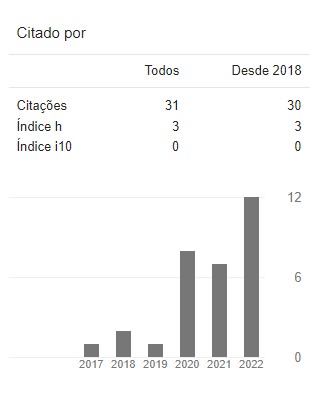Efeito das Dimensões do Comprometimento Organizacional no Desempenho de Tarefas
Resumo
Esta pesquisa objetiva avaliar o efeito das dimensões do comprometimento organizacional no desempenho de tarefas. Para isso foi realizado um estudo de caráter descritivo, com uma abordagem quantitativa, por meio de uma survey single entity. Como instrumento de coleta de dados foi utilizado um questionário online e impresso, composto por 25 assertivas. Os respondentes da pesquisa trabalham em uma empresa de construção de embarcação no Estado do Amazonas, Brasil. A coleta ocorreu no mês de junho e julho de 2022. A amostra final foi composta de 70 respondentes. Para a análise dos dados foi utilizada a técnica de modelagem de equações estruturais. Os resultados estatísticos sugerem que apenas a dimensão do comprometimento afetivo afeta positivamente no desempenho de tarefas dos trabalhadores. Conclui-se que os trabalhadores da amostra analisada sentem comprometidos pela empresa por meio do comprometimento afetivo, e com isso oportuniza o melhor desempenho de tarefas, consequentemente o maior desempenho organizacional. Assim, o comprometimento organizacional é prioridade na gestão de desenvolvimento de recursos humanos da empresa estudada, visto os seus reflexos no desempenho de tarefas e aumento da vantagem competitiva.
Referências
Abdelmoula, L., & Boudabbous, S. (2021). Impact of Organizational Commitment on Accounting Professionals’ Performance: Case of Accounting Firms. Journal of Accounting, Business and Management (JABM), 28(2), 59. https://doi.org/10.31966/jabminternational.v28i2.497
Akbar, A. B., Udin, Wahyudi, S., & Djastuti, I. (2018). Spiritual Leadership and Employee Performance: Mediating Role of Organizational Commitment in Indonesian Public University. Journal of Engineering and Applied Sciences, 13(12), 4344-4352. https://medwelljournals.com/abstract/?doi=jeasci.2018.4344.4352
Allen, N. J., & Meyer, J. P. (1996). Affective, Continuance, and Normative Commitment to the Organization: An Examination of Construct Validity. Journal of Vocational Behavior, 49(3), 252–276. https://doi.org/10.1006/jvbe.1996.0043
Al Zefeiti, S. M. B., & Mohamad, N. A. (2017). The Influence of organizational commitment on Omani public employees’ work performance. International Review of Management and Marketing, 7(2), 151-160. https://dergipark.org.tr/en/pub/irmm/issue/32104/355806
Angle, H. L., & Perry, J. L. (1981). An empirical assessment of organizational commitment and organizational effectiveness. Administrative science quarterly, 1-14.
Aslan, M., Yaman, F., Aksu, A., & Güngör, H. (2022). Task performance and job satisfaction under the effect of remote working: Call center evidence. Economics & Sociology, 15(1), 284–296. https://doi.org/10.14254/2071-789X.2022/15-1/18
Berberoglu, A. (2018). Impact of organizational climate on organizational commitment and perceived organizational performance: empirical evidence from public hospitals. BMC Health Services Research, 18(1), 399. https://doi.org/10.1186/s12913-018-3149-z
Borman, W. C., & Motowidlo, S. J. (1997). Task Performance and Contextual Performance: The Meaning for Personnel Selection Research. Human Performance, 10(2), 99–109. https://doi.org/10.1207/s15327043hup1002_3
Casimir, G., Ngee Keith Ng, Y., Yuan Wang, K., & Ooi, G. (2014). The relationships amongst leader-member exchange, perceived organizational support, affective commitment, and in-role performance. Leadership & Organization Development Journal, 35(5), 366–385. https://doi.org/10.1108/LODJ-04-2012-0054
Castanha, E. T., Beuren, I. M., & Gasparetto, V. (2020). Influência da comunicação interna e do engajamento no desempenho de tarefas de servidores públicos. Revista Internacional de Relaciones Públicas, 10(20), 179–200. https://doi.org/10.5783/RIRP-20-2020-10-179-200
Clarke, N. (2006). The relationships between network commitment, its antecedents and network performance, Management Decision, 44(9), 1183-1205. https://doi.org/10.1108/00251740610707677
Colquitt, J.A., Lepine, J. A., & Wesson, M. J. (2015), Organizational Behavior: Improving Performance and Commitment in the Workplace, 4. ed., McGraw-Hill Education, New York, NY.
Diamantopoulos, A., & Siguaw, J. A. (2006). Formative Versus Reflective Indicators in Organizational Measure Development: A Comparison and Empirical Illustration. British Journal of Management, 17(4), 263–282. https://doi.org/10.1111/j.1467-8551.2006.00500.x
Diamantidis, A. D., & Chatzoglou, P. (2019). Factors affecting employee performance: an empirical approach, International Journal of Productivity and Performance Management, 68(1), 171-193, available at: https://doi.org/10.1108/IJPPM-01-2018-0012
Djastuti, I., Rahardjo, S., Irviana, L., & Udin, U. (2019). Fun at work and employee performance: the roles of job satisfaction and organizational commitment in manufacturing companies. WSEAS Transactions on Business and Economics, 16, 153-162. https://eprints2.undip.ac.id/id/eprint/3492
Dome, R., Kemboi, A., & Kapkiai, M. K. (2017). Moderating Effect of Employee Training on the Relationship between Organizational Commitment and Employee Performance among Insurance Firms in Eldoret, Kenya. Journal Of Humanities And Social Science, 22(11), 53. https://doi.org/10.9790/0837-2211065359
Folorunso, O. O., Adewale, A. J., & Abodunde, S. M. (2014). Exploring the Effect of Organizational Commitment Dimensions on Employees Performance: An Empirical Evidence from Academic Staff of Oyo State Owned Tertiary Institutions, Nigeria. International Journal of Academic Research in Business and Social Sciences, 4(8). https://doi.org/10.6007/IJARBSS/v4-i8/1096
Fornell, C., & Larcker, D. F. (1981). Evaluating Structural Equation Models with Unobservable Variables and Measurement Error. Journal of Marketing Research, 18(1), 39. https://doi.org/10.2307/3151312
Hair, J. F., Jr., Hult, G. T. M., Ringle, C., & Sarstedt, M. (2016). A primer on partial least squares structural equation modeling (PLS-SEM). 2. ed. Los Angeles, USA: Sage.
Hair Jr, J. F., Sarstedt, M., Ringle, C. M., & Gudergan, S. P. (2017). Advanced issues in partial least squares structural equation modeling. Sage publications.
Hair, J. F., Risher, J. J., Sarstedt, M., & Ringle, C. M. (2019). When to use and how to report the results of PLS-SEM. European Business Review, 31(1), 2–24. https://doi.org/10.1108/EBR-11-2018-0203
Harrison, D. A., Newman, D. A., & Roth, P. L. (2006). How Important are Job Attitudes? Meta-Analytic Comparisons of Integrative Behavioral Outcomes and Time Sequences. Academy of Management Journal, 49(2), 305–325. https://doi.org/10.5465/amj.2006.20786077
Hendri, M. I. (2019). The mediation effect of job satisfaction and organizational commitment on the organizational learning effect of the employee performance. International Journal of Productivity and Performance Management, 68(7), 1208–1234. https://doi.org/10.1108/IJPPM-05-2018-0174
Jakada, M. B., Rabi’u, A., Ali Hussein, M., & Kurawa, N. S. (2019). Organizational commitment and job performance: a conceptual model. International Journal of Management and Social Sciences, 11(1), 75–82. https://www.researchgate.net/publication/344250477
Jatmiko, B., Laras, T., & Rohmawati, A. (2020). Budgetary Participation, Organizational Commitment, and Performance of Local Government Apparatuses. The Journal of Asian Finance, Economics and Business, 7(7), 379–390. https://doi.org/10.13106/jafeb.2020.vol7.no7.379
Jehanzeb, K., & Mohanty, J. (2019). The mediating role of organizational commitment between organizational justice and organizational citizenship behavior. Personnel Review, 49(2), 445–468. https://doi.org/10.1108/PR-09-2018-0327
Leguina, A. (2015). A primer on partial least squares structural equation modeling (PLS-SEM). International Journal of Research & Method in Education, 38(2), 220–221. https://doi.org/10.1080/1743727X.2015.1005806
Leroy, H., Palanski, M. E., & Simons, T. (2012). Authentic Leadership and Behavioral Integrity as Drivers of Follower Commitment and Performance. Journal of Business Ethics, 107(3), 255–264. https://doi.org/10.1007/s10551-011-1036-1
Lizote, S. A., Verdinelli, M. A., & Nascimento, S. (2020). Empresas prestadoras de serviços contábeis sob a ótica do comprometimento organizacional e a satisfação no trabalho. Revista Contabilidade e Controladoria, 11(2). https://doi.org/10.5380/rcc.v11i2.58403
Mahama, H., & Cheng, M. M. (2013). The Effect of Managers’ Enabling Perceptions on Costing System Use, Psychological Empowerment, and Task Performance. Behavioral Research in Accounting, 25(1), 89–114. https://doi.org/10.2308/bria-50333
Medeiros, C. A. F., & Enders, W. T. (1998). Validação do modelo de conceitualização de três componentes do comprometimento organizacional (Meyer e Allen, 1991). Revista de Administração Contemporânea, 2(3), 67–87. https://doi.org/10.1590/S1415-65551998000300005
Melo, M. A. de S., Bezerra, J. C. B., Coleta, M. F. dela, Puente-Palacios, K. E., Coleta, J. A. D., & Bezerra, A. L. Q. (2014). Comprometimento organizacional de trabalhadores da vigilância sanitária em municípios do estado de Goiás. Trabalho, Educação e Saúde, 12(3), 655–677. https://doi.org/10.1590/1981-7746-sip00018
Menezes, I. G., & Bastos, A. V. B. (2009). Bases sociológicas, antropológicas e psicológicas do comprometimento organizacional. Psicologia Em Revista, 15(03). https://doi.org/10.5752/P.1678-9563.2009v15n3p200
Meyer, J. P., & Allen, N. J. (1991). A three-component conceptualization of organizational commitment. Human Resource Management Review, 1(1), 61–89. https://doi.org/10.1016/1053-4822(91)90011-Z
Meyer, J. P., & Allen, N. P. (1997). Commitment in the workplace: Theory, research and application. Thousand Oaks, CA: Sage Publications
Mowday, R. T., Steers, R. M., & Porter, L. W. (1979). The measurement of organizational commitment. Journal of Vocational Behavior, 14(2), 224–247. https://doi.org/10.1016/0001-8791(79)90072-1
Mowday, R. T., Porter, L. W., & Steers, R. M. (1982). Employee–organization linkages: The psychology of commitment, absenteeism, and turnover, 153. New York: Academic Press.
Mucci, D. M., Frezatti, F., & Dieng, M. (2016). As múltiplas funções do orçamento empresarial. Revista de Administração Contemporânea, 20, 283-304. https://doi.org/10.1590/1982-7849rac2016140121
Negin. M, Omid.M and Ahmad, B.M (2013). The Impact of Organizational Commitment on Employees job performance. A study of Meli Bank. International Journal of Contemporary Research in Business, 5(5), 164-171.
Ohana, M., & Meyer, M. (2016). Distributive justice and affective commitment in nonprofit organizations. Employee Relations, 38(6), 841–858. https://doi.org/10.1108/ER-10-2015-0197
Oyeniyi, K., Adeyemi, M., & Olaoye, B. (2017). Organizational Commitment and Employee’s Job Performance: Evidence from Nigerian Hospitality Industry. International Journal of Innovative Psychology & Social Development 5(3), 15-22. https://seahipaj.org/journals-ci/sept-2017/IJIPSD/full/IJIPSD-S-2-2017.pdf
Philippaers, K., de Cuyper, N., & Forrier, A. (2019). Employability and performance. Personnel Review, 48(5), 1299–1317. https://doi.org/10.1108/PR-04-2017-0098
Qaisar, M.U, Rehman, M.S and Suffyan.M (2012). Exploring Effects of Organizational Commitment on Employee Performance: Implications for Human Resource Strategy. Interdisciplinary Journal of Contemporary Research In Business, 3(11), 248 – 255.
Razzaq, S., Shujahat, M., Hussain, S., Nawaz, F., Wang, M., Ali, M., & Tehseen, S. (2019). Knowledge management, organizational commitment and knowledge-worker performance. Business Process Management Journal, 25(5), 923–947. https://doi.org/10.1108/BPMJ-03-2018-0079
Ringle, C. M., da Silva, D., & Bido, D. D. S. (2014). Modelagem de Equações Estruturais com Utilização do Smartpls. Revista Brasileira de Marketing, 13(2), 56–73. https://doi.org/10.5585/remark.v13i2.2717
Ribeiro, N., Yücel, I., & Gomes, D. (2018). How transformational leadership predicts employees’ affective commitment and performance, International Journal of Productivity and Performance Management, 67(9), 1901-1917, available at: https://doi.org/10.1108/IJPPM-09-2017-0229
Siswanto, D. J., Basalamah, S., Mus, A. R., & Semmaila, B. (2020). Transformational leadership, trust, work involvement, soldier’s job satisfaction. Management Science Letters, 3143–3150. https://doi.org/10.5267/j.msl.2020.5.008
Somers, M. J., & Birnbaum, D. (1998). Work‐related commitment and job performance: it's also the nature of the performance that counts. Journal of Organizational Behavior: The International Journal of Industrial, Occupational and Organizational Psychology and Behavior, 19(6), 621-634.
Souza, G. E. de, & Beuren, I. M. (2018). Impact of an enabling performance measurement system on task performance and job satisfaction. Revista Contabilidade & Finanças, 29(77), 194–212. https://doi.org/10.1590/1808-057x201805850
Sukanebari, E., & Konya, K. T. (2020). Continuance Commitment and Organisational Performance of Manufacturing Firms in Port Harcourt, Nigeria. International Journal of Innovative Social Sciences & Humanities Research, 8(1), 80-91. https://seahipaj.org/journals-ci/mar-2020/IJISSHR/full/IJISSHR-M-9-2020.pdf
Wang, Q., Weng, Q. D., & Jiang, Y. (2020). When Does Affective Organizational Commitment Lead to Job Performance?: Integration of Resource Perspective. Journal of Career Development, 47(4), 380–393. https://doi.org/10.1177/0894845318807581
Zatzick, C. D., Deery, S. J., & Iverson, R. D. (2015). Understanding the Determinants of Who Gets Laid Off: Does Affective Organizational Commitment Matter? Human Resource Management, 54(6), 877–891. https://doi.org/10.1002/hrm.21641
Zayas-Ortiz, M., Rosario, E., Marquez, E., & Colón Gruñeiro, P. (2015). Relationship between organizational commitments and organizational citizenship behaviour in a sample of private banking employees. International Journal of Sociology and Social Policy, 35(1/2), 91–106. https://doi.org/10.1108/IJSSP-02-2014-0010
Copyright (c) 2023 Creative Commons License Este trabalho está licenciado sob uma licença Creative Commons Attribution 4.0 International License.

This work is licensed under a Creative Commons Attribution 4.0 International License.
Os direitos autorais para artigos publicados nesta revista pertencem ao(s) respectivo(s) autor(es), com direitos de primeira publicação cedidos para a Revista Paraense de Contabilidade – RPC. Em virtude de aparecerem nesta revista de acesso público, os artigos são de uso gratuito, com obrigatoriedade de reconhecimento da autoria original e da publicação inicial nesta revista.
A revista permitirá o uso dos trabalhos publicados, incluindo direito de enviar o trabalho para bases de dados de acesso público.
O conteúdo dos artigos publicados são de total e exclusiva responsabilidade dos autores. Ao submeter o artigo, de forma automática e expressa:
- O(s) autor(es) autoriza(m) a publicação do artigo na revista;
- O(s) autor(es) garante(m) que a contribuição é original e inédita e que não está em processo de avaliação em outra(s) revista(s);
- A revista não se responsabiliza pelas opiniões, ideias e conceitos emitidos nos textos, por serem de inteira responsabilidade de seu(s) autor(es);
- É reservado aos editores o direito de proceder ajustes textuais e de adequação do artigo às normas da publicação.












.png)
